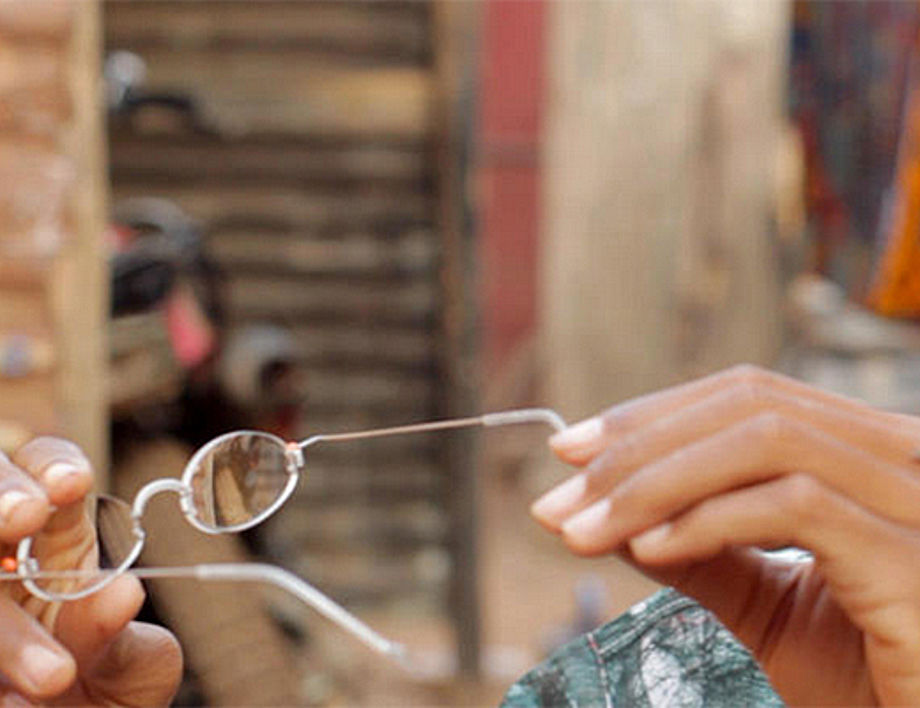Passau researchers examine value of OneDollarGlasses in Burkina Faso


OneDollarGlasses offers a solution to millions of people in developing countries in need of a pair of glasses: The glasses only cost a few dollars; still, sales are sagging. A team of researchers from Passau analyse the reasons in Burkina Faso.
Defective vision is one of the most common disabilities worldwide. It is estimated that in developing countries more than 700 million people would need a pair of glasses, but cannot afford it. OneDollarGlasses offers a solution: Glasses that consist of a lightweight, flexible spring steel frame and prefab lenses and can be locally manufactured with simple bending machines. The material costs are approximately 1 US $. Yet, distributing the OneDollarGlasses through the market is a challenge not only due to poverty, but also due to a lack of awareness, beliefs and interest.
This project aims to elicit the willingness to pay (WTP) for OneDollarGlasses (ODG) for adults. This exercise aims to shed light onto the determinants for buying glasses, i.e. the price which is considered a key factor in these constrained settings and which constitutes a key decision parameter in the marketing strategy.
Thus far the willingness to pay for eyeglasses more generally and ODG glasses more specifically has not yet been rigorously explored. Existing studies asking participants the simple question of how much they would be willing to pay for eyeglasses report figures ranging between 1 to 4 USD (Glewwe and Schaffner, 2014; Karnani et al., 2011).
In this project, we elicit the willingness-to-pay for eyeglasses for adults through a variant of the Becker-DeGroot-Marschak (BDM) method, whereby the participants are invited to bid a price for eyeglasses. If their bid exceeds a randomly drawn price, they receive the eye glasses for exactly that price. This ensures that participants have an incentive to bid a price that corresponds exactly to their own valuation of the product. With a sufficiently large sample, this experiment allows to obtain a very detailed picture of the market demand. The experiment will be conducted in Burkina Faso in the department of Kaya.
Role of financial constraints
We know that households in Burkina Faso are financially constrained and that these constraints can influence the stated willingness to pay. In order to understand the role that liquidity constraints play for the price willing to pay, we will randomize the payment modalities: one group will have to pay immediately, whereas a second group gets a deferred payment.
In addition to the financial constraints also information might play an important role in influencing the price that participants are willing to pay. As part of the standard ODG activities, all participants that have been undergone a vision screening and are in need of eyeglasses are educated on the ‘obvious' benefits of eyeglasses and how to use, take care and protect their glasses. To see if participants' prices are affected by additional information given to them, we will expose a random group of participants to what we term an ‘intensive awareness training package'.
Project Team
Academic
- Prof. Michael Grimm, University of Passau (Principal Investigator)
- Dr. Renate Hartwig, University of Namur (Co-Principal Investigator)
- Franziska Schiessl, University of Passau (Field Research Assistant)
Implementing Agency
- Markus Urff (ODG, Germany)
- Anke Hoffmann (ODG, Germany)
- Thomas Remont (ODG, Burkina Faso)
| Principal Investigator(s) at the University | Prof. Dr. Michael Grimm (Lehrstuhl für Development Economics) |
|---|

